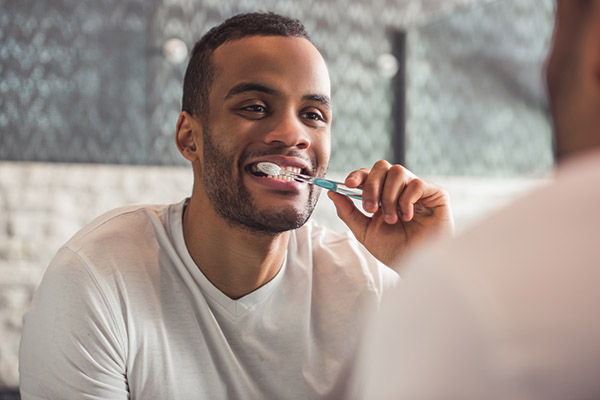 Anyone familiar with oral hygiene basics knows that dentists recommend brushing twice a day: once in the morning and once at night. However, you may not know why this is so. Why is once not enough? After all, experts recommend flossing only once a day. How is brushing your teeth different?
Anyone familiar with oral hygiene basics knows that dentists recommend brushing twice a day: once in the morning and once at night. However, you may not know why this is so. Why is once not enough? After all, experts recommend flossing only once a day. How is brushing your teeth different?
Why you should brush twice a day
Brushing your teeth is a key part of oral hygiene basics, as it removes plaque that contains bacteria. This bacteria eats away at teeth and gums, causing cavities and gum disease.
While brushing your teeth once a day is better than not brushing at all, it does not do enough to prevent plaque. Every time you eat, you introduce more bacteria into your mouth, and twice-daily brushing ensures you remove as much as possible without hurting your gums or enamel.
Prevents stains
Certain foods, such as coffee, can stain the enamel coating on teeth. Over time, these stains build-up, making your smile appear yellow or even brown. Regular teeth brushing can prevent staining by removing the offending food.
Fights tartar buildup
When plaque remains on your teeth for too long, it hardens and becomes tartar. In most cases, you need to see a dentist remove tarter, as regular brushes are not strong enough to do so.
Prevents bad breath
Have you ever wondered what causes bad breath? It is bacteria eating away at your teeth and the little bits of food stuck on them.
When you brush your teeth, you clear away that odor-causing bacteria. So, if you want to have fresh breath, it is better to brush your teeth regularly rather than chowing down on mints.
How to brush your teeth effectively
How you brush your teeth is just as important as how often you do it. For starters, you should use a soft-bristle brush to avoid hurting your gums. In most cases, soft-bristle brushes are stiff enough to remove plaque without causing damage. If you have stains you want to remove, you can use a hard-bristle brush occasionally, but you must take care not to apply too much pressure.
Brush for two minutes
Dentists recommend brushing for two minutes. Brushing harder does not shorten the time — instead, the time limit is to help you thoroughly address each tooth. Start with your molars and brush every side of each tooth, moving down the line until each one is clean.
Use circular motions
While brushing up and down may feel more natural, the best way to clean your teeth is to move the brush in small, circular motions. This approach is more effective, ensuring you get the most out of your two-minute routine.
How you benefit from observing oral hygiene basics
Your teeth allow you to eat all your favorite foods, so it is vital that you care for them. Failure to fight plaque can lead to pain, tooth loss, and expensive dental procedures. If you want to save money and protect your beautiful smile, then it is essential you brush your teeth twice a day, every day.
Request an appointment or call Gledhill Dental at 509-800-8410 for an appointment in our Kennewick office.
Related Posts
Implant supported dentures combine traditional dentures with permanent dental implants to provide a stable and secure tooth restoration option. Unlike traditional removable dentures, this option is supported by two or more dental implants rather than your gum tissues. The additional stability of dental implants may make it simpler to bite and chew meals, particularly with…
Having a solid handle on good oral hygiene basics will help preserve the integrity of your teeth and mouth health for a long time to come. Steering clear of cavities, receding gums, or decay ensures that your smile is bright and beautiful for as long as possible. If you think you already have an excellent…
Having a firm understanding of oral hygiene basics can prevent tooth decay, gum disease, and general oral discomfort. Human beings go through life developing a range of habits that impact oral health, some of which are good and some of which are bad. Avoiding these damaging behaviors promotes strong teeth and gums that can last…


